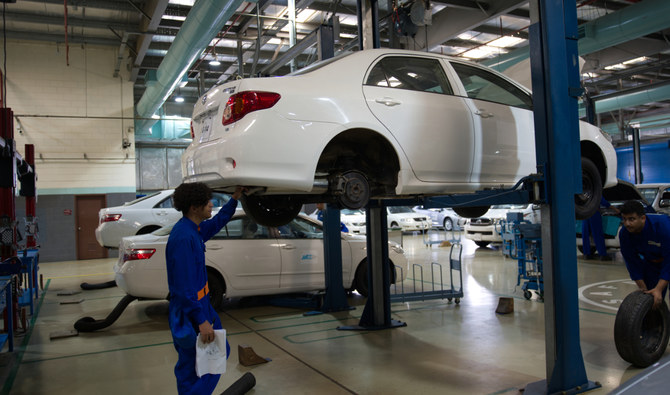JEDDAH: The rapid growth of Saudi Arabia’s automotive sector means more demand for advanced technology and skilled professionals — and the Saudi Japanese Automobile High Institute has stepped up to help.
The non-profit center offers specialized technical training for Saudi high school graduates, with a particular emphasis on Japanese automobile technology. It was established in 2003 with support from the late King Abdullah and symbolizes collaboration between the Kingdom and Japan.
Institute CEO Hattan Nadhirah told Arab News that the Saudi youth’s perception of car mechanics had changed significantly in recent times. He attributed this to advances in governance, the ambitious goals of Saudi Vision 2030, and a growing interest in sports events hosted in the Kingdom such as Formula 1 and the Dakar Rally.
“We are fostering stronger ties between Japan and Saudi Arabia through our continuous support for the institute since its establishment. This includes providing state-of-the-art equipment and Japanese experts, all of whom are government-sponsored scholars,” said Nadhirah.
The institute provides a comprehensive two-year training program and has capacity for up to 500 students. It focuses on practical training with modern equipment and has over 100 Japanese cars available to give students hands-on experience.
The international faculty, consisting of experts from eight nations including Saudi Arabia, Japan, the Philippines, Indonesia, India, Pakistan, Sri Lanka and Egypt, provides a diverse learning environment.
Sohaib NoorAldin, the institute’s acting education manager, said: “Each level of classrooms can accommodate more than 300 students, but to maintain the quality of education, we prefer not to exceed 250 students. Each class consists of 50 students divided into five groups.”
Every class has two trainers, with students assigned to cars in groups of five. A team leader role is assumed by each student in turn to give everyone leadership experience.
Among the institute’s innovative technologies is a 3D-printed simulator for hybrid cars, while projects include building a buggy-type car from scratch.
NoorAldin said an ordinary Nissan Sunny car, worth around SR10,000 (around $2,665) was now valued at more than SR70,000 after being converted into a detailed training vehicle.
He added the institute prioritized safety by implementing the 5Ss principle — which involves shifting, sorting, sweeping and washing, spic and span, and self-discipline — and medical lectures.
“The 5Ss principle is considered the lifeblood of the students and the institute, as you will find this board hanging everywhere to avoid any chaos … that could cause risks,” said NoorAldin.
Before graduation, students are offered practical, on-the-job training at renowned automotive companies across the Kingdom such as Toyota, Nissan, Honda, Suzuki, Isuzu and Subaru.
“We consider ourselves the primary source for providing professionally trained students in this sector in the Kingdom,” added NoorAldin. “We then receive evaluations from the trainers to identify weaknesses, which we address and solve through the curriculum in the following years.”
A team from Nippon Engineering College and Honda Technical College works closely with the institute to study and update its curriculum based on industry needs.
This collaboration reflects a strong connection with Japan which is also evident in the institute’s classrooms, which have Japanese architectural features.
NoorAldin said the relationship included continuous evaluation and curriculum enhancements by the Japanese International Cooperation Agency to ensure students met the automotive industry’s evolving needs.
An annual technical skills competition highlights the students’ aptitude and proficiency, with a 40-minute time limit for maintenance tasks such as electrical fault diagnosis, engine measurements and gearbox diagnostics. Five teams of two students are evaluated by a judging panel and the winners receive prizes and the opportunity to showcase their abilities to industry sponsors.
Saud Ahmad Alghanim, the student who won first place in this year’s competition after breaking the record of 37 minutes, told Arab News: “I joined SJAHI to break my stress and develop my confidence … my experience was wonderful and terrifying because we were racing (against the clock) to complete our work in front of everyone’s eyes.”
Another student, Yazeed Waleed Sendi, added: “Joining SJAHI improved my organization abilities, it boosted my confidence and taught me how to handle stress, and be ready to face different situations.”
Meanwhile, student Aseel Mashabi shared some advice for those hoping to pursue an automotive-related career: “Be passionate … never give up on the challenges that you face.”
And trainee Sadiq Al-Abdullah said: “I believe the institute prepared me in an excellent way. It gave me a head start when I joined the job market.”
Registration for students to join the institute for the next academic year is open until the end of July.





























